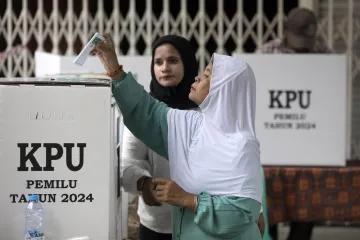Indonesia election: Unofficial vote count shows defence minister Prabowo is leading
Unofficial figures in Indonesia's presidential election showed Defence Minister Prabowo Subianto taking a clear early lead on Wednesday with 59.8% of votes, based on 23.3% of ballots counted in a sample of polling stations nationwide.
Bali: Indonesians have voted for a new president Wednesday as the world’s third-largest democracy aspires to become a global economic powerhouse a quarter-century after shaking off a brutal dictatorship. Voting ended Wednesday afternoon with no major problems reported across the archipelago. Early and unofficial results were expected within the day by quick-count outlets certified by the General Election Commission. Official final results will come in about a month.
The front-runner in pre-election polls, Defense Minister Prabowo Subianto, was the only candidate with ties to the Suharto era. He was a special forces commander at the time and has been accused of human rights atrocities, which he vehemently denied. Two former provincial governors, Anies Baswedan and Ganjar Pranowo, were also vying to succeed the immensely popular President Joko Widodo, who is serving the final of his two terms in office. Widodo’s rise from a riverside slum to the presidency has shown the vibrancy of Indonesia’s democracy in a region rife with authoritarian regimes.
Unofficial figures in Indonesia's presidential election showed Subianto taking a clear early lead on Wednesday with 59.8% of votes, based on 23.3% of ballots counted in a sample of polling stations nationwide.
Widodo’s successor will inherit an economy with impressive growth and ambitious infrastructure projects, including the ongoing transfer of the nation’s capital from congested Jakarta to the frontier island of Borneo at a staggering cost exceeding $30 billion.
High stakes for US and China
The election also has high stakes for the United States and China, since Indonesia has a huge domestic market, natural resources like nickel and palm oil, and diplomatic influence with its Southeast Asian neighbours.
The logistics of the vote across the tropical nation’s 17,000 islands inhabited by 270 million people were daunting: Ballot boxes and ballots were transported by boats, motorcycles, horses and on foot in some of the more far-flung locations.
A fierce thunderstorm flooded several streets of Jakarta at dawn Wednesday. Last week, damage from heavy rains in Central Java’s Demak regency prompted the postponement of the election in 10 villages. Aside from the presidency, some 20,000 national, provincial and district parliamentary posts were contested by tens of thousands of candidates in one of the world’s largest elections, which authorities said concluded with no major problems. About 10,000 aspirants from 18 political parties eyed the national parliament’s 580 seats alone.
What voters want from new President
Voters interviewed by news agency The Associated Press expressed hope their next leader would help them achieve greater prosperity in a country where nearly a tenth of the population still lives in poverty. “I hope Indonesia can progress better and that I did not vote for the wrong person,” said Indra Nurohim, a 17-year-old high school student and first-time voter. “I hope we will have a better government.” The official vote tally is a laborious process that could take about a month, but early results based on sampling from registered private polling and survey groups are considered a reliable indicator of the final results. The presidential race will go to a runoff on June 26 if no candidate gets more than 50% of the votes.
Subianto, the oldest presidential candidate at 72, lost in two previous runs to Widodo but was the front-runner in independent surveys. He picked Widodo’s eldest son, Gibran Rakabuming Raka, as his vice-presidential running mate in a move that could shore up his chances given the outgoing president’s popularity. Raka, 36, was allowed to run when the Constitutional Court made an exception to the minimum age requirement of 40. The court was then headed by Widodo’s brother-in-law, who was removed by an ethics panel for not recusing himself, and Widodo was accused of favouritism and nepotism.
Widodo of trying to build a political dynasty: Criticis
Critics have accused Widodo of trying to build a political dynasty despite his being the first president to emerge outside the political and military elite since the 1998 end of the dictatorial rule of Suharto, characterized by widespread human rights violations, plunder and political unrest. Subianto, a former lieutenant general who married one of Suharto’s daughters, was a longtime commander in the army special forces, called Kopassus. He was dishonourably discharged in 1998 after Kopassus forces kidnapped and tortured political opponents of Suharto.
Of at least 22 activists kidnapped that year, 13 remain missing to this day, and their families protest weekly outside the presidential palace demanding the activists be accounted for. Subianto never faced a trial and vehemently denied any involvement, although several of his men were tried and convicted.
(With inputs from agencies)
Also Read: Indonesia Presidential election: Here’s what it means for US and China I EXPLAINED
